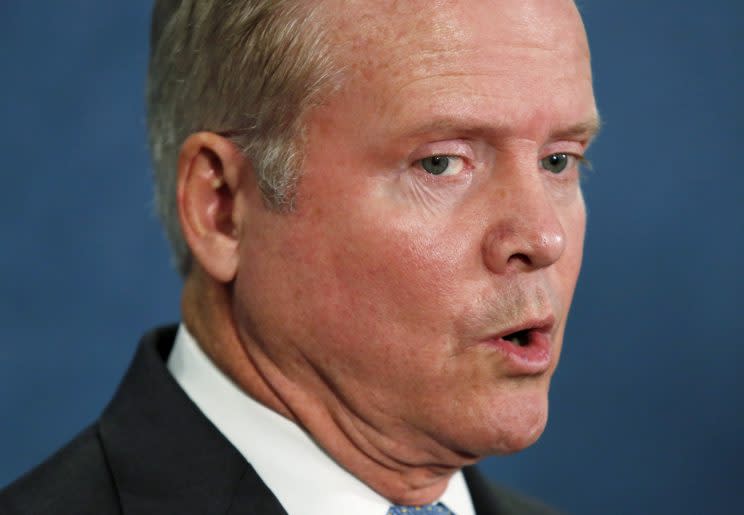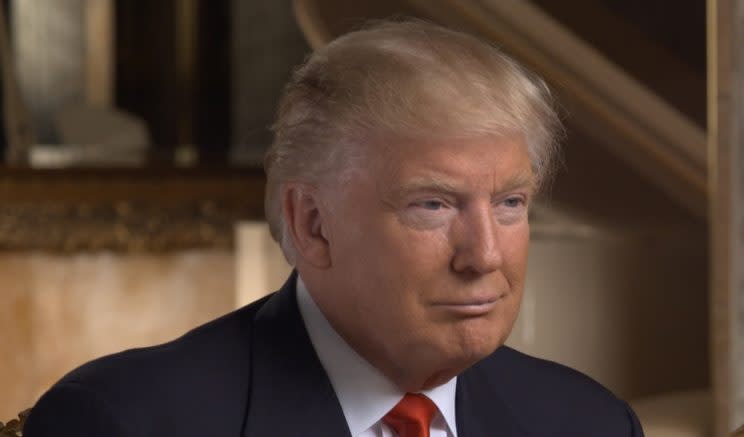Supporters float Jim Webb’s name for top Trump Defense or State job

Former Democratic Sen. Jim Webb’s name was floated as a possible choice for secretary of defense or state at a Tuesday foreign policy event in Washington, D.C.
Webb has not been mentioned by the Trump transition team as a possible choice, so it was not clear Tuesday if the move was an effort by allies to push his name into consideration.
Regardless, Webb would be a fascinating alternative for President-elect Trump for multiple reasons. First, he is highly qualified for a top post overseeing the Pentagon or the nation’s foreign policy. He’s a former Marine who was wounded in combat in the Vietnam War and awarded the Navy Cross and two Purple Hearts, and then went on to serve as assistant secretary of defense for reserve affairs and secretary of the Navy under Ronald Reagan.
Some of Webb’s foreign policy views also match Trump’s. Trump was criticized for falsely saying he opposed the Iraq War from the beginning, but he did stake his candidacy on opposition to the war and excessive intervention. Webb is decidedly anti-interventionist as well. He opposed Bush’s decision to invade Iraq well before the invasion took place in 2003. And he is currently a vociferous critic of the Obama administration’s interventions in Libya and of its policy in Syria.
Webb won a seat in the U.S. Senate in 2006 based in large part on his opposition to the Iraq War. He decided in 2012 not to seek reelection, and mounted a brief and unsuccessful run for president in the Democratic primary this cycle. He withdrew in 2015, before the first contest.
It’s common practice for modern presidents to have at least one high-profile member of the rival party in their administrations. In addition to keeping his predecessor’s defense secretary, President Obama appointed former Sen. Chuck Hagel, R-Neb., to secretary of defense and former Rep. Ray LaHood, R-Ill., transportation secretary. And George W. Bush named Norman Mineta, a secretary of commerce under Bill Clinton, to be his transportation secretary.
The two leading names being mentioned so far as a possible Trump secretary of state— John Bolton and Rudy Giuliani — come from a far more hawkish, pro-interventionist wing of the GOP.
Bolton, a former U.S. ambassador to the United Nations and top State Department official under Bush, is a foreign policy hawk who has supported regime change not only in Libya but also in Iran and Syria. Sen. Rand Paul, R-Ky., who has long been one of the GOP’s most outspoken non-interventionist voices, said Tuesday he would oppose both Bolton and Giuliani. Paul told Yahoo News he would prefer to see Tennessee Sen. Bob Corker — whose name has also been mentioned — chosen as secretary of state, but that he would give “serious consideration” to Webb.
Another linkage between Webb and Trump is that Webb’s opposition to foreign entanglements is based in part on his identification with the white working class, a key part of Trump’s winning coalition.
“Webb’s is the voice of an intellectual, and deeply felt and earned populism,” said Bill Kauffman, a writer for the American Conservative, the magazine that hosted the Tuesday event, in his introduction of Webb.

Kauffman lauded Webb’s many career turns, including that of a novelist, calling him “the best politician-novelist since Brand Whitlock, the early 20th-century realist and mayor of Toledo.”
“James Webb has explored, with gimlet eye and felicitous pen, the culture gap separating those who live and work and struggle and love in the forgotten America, people who are anything but deplorable, from the privileged few who run the elite institutions in this country and who send the young men and now young women of the forgotten America off to die in inscrutable and undeclared wars,” Kauffman said.
Kauffman continued, saying of Webb: “He spoke what now seems prophecy, when in ‘Born Fighting,’ his history of the Scottish and Irish in America, Webb praised the Jacksonian populace of Appalachia, the Rust Belt, the South, and the broad Midwest as ‘the greatest obstacles to what might be called the collectivist taming of America, symbolized by the edicts of political correctness. And for the last 50 years the left has been trying to do everything in its power to sue them, legislate against their interests, mock them in the media, isolate them as idiosyncratic, and publicly humiliate their traditions in order to make them, at best, irrelevant to America’s future growth.’”
Kaufmann paused, and with evident pleasure at the shocking results of last week’s presidential election, said, “They’re not so irrelevant now, are they?”
Kauffman then floated Webb and retired Army Col. Andrew Bacevich, another outspoken opponent of the Iraq War.
“If anybody happens to be looking for a secretary of state or a secretary of defense, the two best candidates are in this room today: Andrew Bacevich and James Webb,” Kauffman said.
Webb himself said in his speech that “the Democratic Party, unfortunately … moved away from working white people.”
“It made white working people their most convenient whipping posts, particularly white males,” Webb said.
Webb also said that under Trump, the U.S. is “now facing four years … where we are going to be divided, but in terms of our foreign policy, this is an opportunity to reshape our national strategy in a way that otherwise has not been possible.” He said that since the collapse of the Soviet Union, the U.S. has not had a “clear statement of national security interests,” so its foreign policy has been in a state of drift.
He also provided a substantive critique of the North Atlantic Treaty Organization, which Trump has voiced reservations about.
“NATO expansion has created new environment in terms of how it works,” Webb said. “Many new members are clearly protectorates rather than allies.”
After Webb’s speech, a number of questioners asked him about the current speculation over Trump’s top appointments. One member of the audience said, without citing evidence, that there was “an incredible rumor going around” that Webb was actively being considered, and asked if Webb would serve if asked.
Webb did not acknowledge that part of the question. He focused on a mention by the questioner of his work in the U.S. Senate and spoke about legislation he helped pass.
However, Webb did have an opinion when asked about Bolton and Giuliani. He avoided commenting on their particular qualifications but cautioned against concluding that they were the only names under consideration.
“It’s premature to make a judgment on who’s even going to be in this administration,” Webb said.




